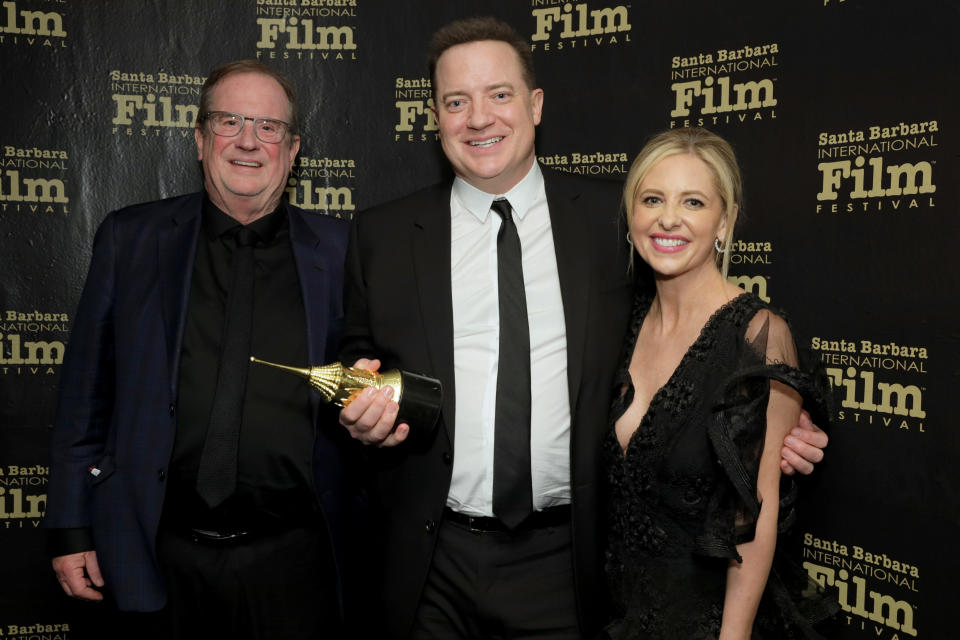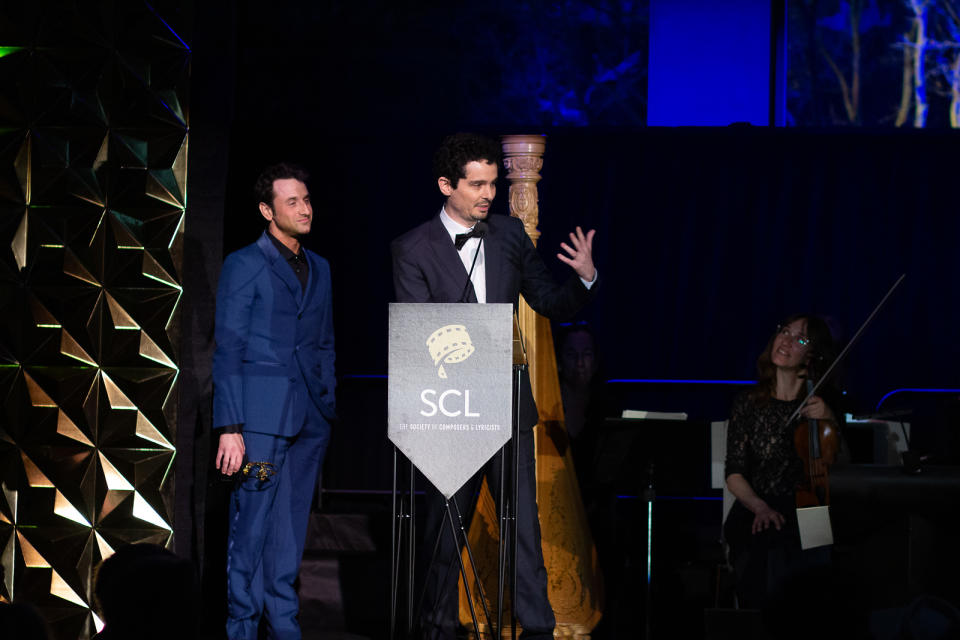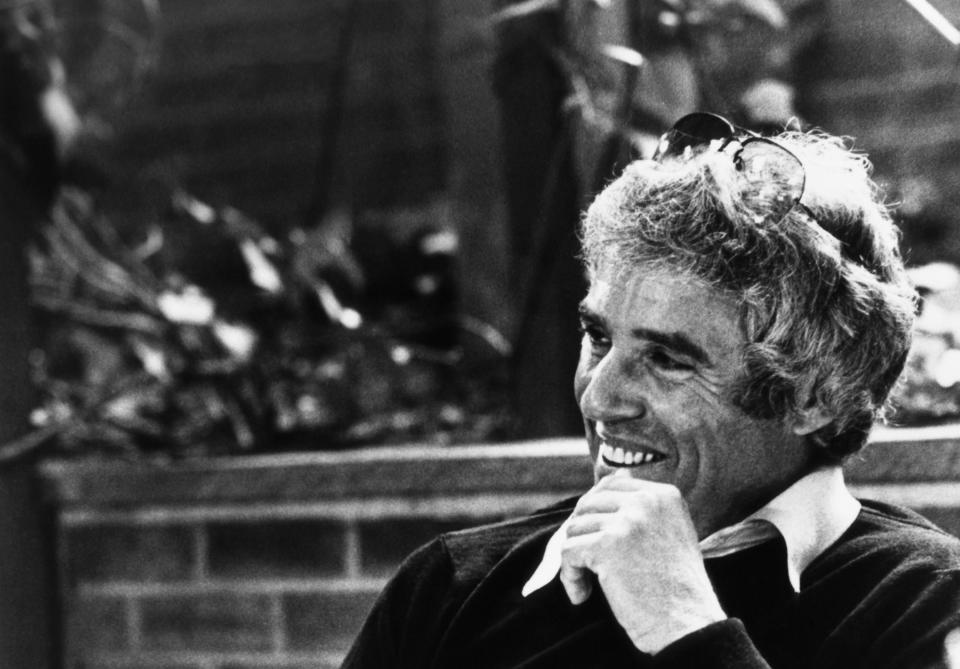Brendan Fraser Names Co-Star He Hated At SBIFF Tribute; ‘All Quiet’ Making Oscar Noise; Burt Bacharach’s Rejection By John Ford – Notes On The Season
- Oops!Something went wrong.Please try again later.
- Oops!Something went wrong.Please try again later.

A column chronicling conversations and events on the awards circuit.

I don’t know about you, but I spent my Valentine’s Day evening onstage at the Arlington Theatre for the Santa Barbara Film Festival’s American Riviera Award tribute to Brendan Fraser. I have to say it was definitely a love affair between the sold-out audience in that huge venue and the Oscar-, SAG- and BAFTA-nominated and Critics Choice Award-winning star of The Whale.
More from Deadline
Dionne Warwick Remembers Burt Bacharach: "Like Losing A Family Member"
Burt Bacharach Dies: Hit-Making Composer Of 'Raindrops Keep Fallin' On My Head' & Many Others Was 94

SBIFF produces these elaborate two-hour tributes to various Oscar nominees each year, and this year’s crop has included Cate Blanchett, Angela Bassett, Jamie Lee Curtis, and Colin Farrell & Brendan Gleeson together. I have been doing these for the past two decades and this one was so much fun to do, and you couldn’t find a more deserving or genuinely nice recipient. At the end of it, Fraser’s The Air I Breathe co-star Sarah Michelle Gellar presented him with the award.
When I ran into Fraser at the Oscar Nominees Luncheon on Monday, I told him I had been looking at film clips of his storied career that morning, and that he should be prepared to watch his cinematic life pass before his eyes (especially in a dazzling four-minute sizzle reel cut to the Foo Fighters song “Walk” cannily chosen by SBIFF artistic director Roger Durling, its lyrics about “learning to walk again” — a nice musical touch for Fraser’s own return to glory).
In my opening remarks on Tuesday I recounted my previous onstage conversation with Fraser, back in October 2019 when the Heartland Film Festival in Indianapolis flew me out to interview him after a screening for the 20th anniversary of The Mummy. Right then, right there in the Midwest town in which Fraser was born, I could tell he still had a rabid fan base. It was like a rock concert, and so for that matter was the reception he got in Santa Barbara as I walked him through his career with clips ranging from his breakthrough 1991 films Encino Man and School Ties all the way 30 years later to his acclaimed and Oscar-contending performance as a 600-pound man desperately trying to reunite with his estranged teenage daughter in The Whale.

From talking about influences like Buster Keaton for his performance as a caveman and the relevance for today of his role as a Jewish high school jock experiencing antisemitism in those two early 1991 films, we traversed highlights of a varied career where Fraser ruled the 1990s and first decade of this century before cooling off in features a bit until his “comeback” now in The Whale. But as he told me he really isn’t “coming back” because he has always been working as an actor and would go nuts if he wasn’t. I introduced the evening as “welcome to the Brenaissance,” a deserved new appreciation of an actor of great range as the clips reminded us, from physical comedy in Encino Man and George of the Jungle and Bedazzled, to action movie star in the Mummy movies, to working opposite greats like Michael Caine and Ian McKellen in their Oscar-nominated performances. It was quite a night of memories.

I also pointed out I rarely get to interview actors whose filmography also includes working opposite movie legends like Bugs Bunny and Daffy Duck as he did in the live-action/animated hybrid, Looney Tunes: Back In Action, or other various real and CGI animals and creatures. In fact, the highlight for me was when Fraser decided to share a story about his monkey co-star Mr. Binks in George of the Jungle right after I got Fraser and the audience to sing a bit of that movie’s and TV cartoon show inspiration’s iconic theme song. There is no way to do this wild story of Brendan and his simian scene partner in print, or the faux surprise I pulled on him afterwards, so you just have to watch and see for yourself why the audience went crazy.
Here’s the video below:
Thanks Brendan for a great Valentine’s Day and the nice words too. A night to remember for all of us. Hopefully Mr. Binks is smiling somewhere and rooting you on at the Oscars.
‘ALL QUIET’ GETTING LOUDER
Netflix started out the season thinking it had bigger fish to fry in this year’s Oscar Best Picture race than the highly praised but modesty priced (under $20 million) World War I anti-war epic All Quiet on the Western Front, Germany’s entry for the International Feature race. It wasn’t even one they took to the major fall festivals like Venice or Telluride (it did appear at TIFF and some regional fests), a breeding ground for likely nominees. But it has slowly built support over the past few months especially among Academy members with whom I speak, and who are passionate about how good it is. In an upcoming Behind the Lens segment I taped while he was briefly in town this week on a break from shooting his next film The Conclave at Cinecitta in Rome, director/co-writer Edward Berger talked about the relevance this story still has, especially now as we see images on TV news from the war in Ukraine that look uncannily like those in his film, even though it was shot and conceived well before that Russian invasion.

Netflix is determined to keep the movie in some select theaters as well, ever since it has a generous global exhibition footprint in early fall before streaming on the service. The streamer in fact will be expanding it’s theatrical engagements in select major cities Los Angeles, New York, Chicago and London with new specially struck 35 mm film prints, which will certainly enhance the gritty and stunning look of the film that defied all odds for a subtitled German film and scored nine Academy Award nominations including International Feature (where it is heavily favored) but also Best Picture, Adapted Screenplay and several crafts nods. This weekend it is also up for a whopping 14 BAFTA awards, so it could gain some momentum in the race there.
Can it defy the odds at the Oscars? Statistically it is a big mountain to climb. The original screen version of All Quiet on the Western Front from director Lewis Milestone won Best Picture in 1930. No remake of a Best Picture winner has ever gone on to win the Oscar. It also has the added drawback of not having a Best Director nomination for Berger, or any actors nominated (the actors branch is the Academy’s largest by far). And then there is this: No film has gone on to win the Oscar Best Picture without at least one nomination from the major guilds (WGA, DGA, PGA and SAG) — that is since these guilds have been collectively conducting their own awards ceremonies. The good news for All Quiet, which has been making noise despite all that, is that precedents in recent Oscar seasons are consistently being broken, from 2019’s Parasite (the one and only foreign-language film to win Best Picture) to CODA last year.
MUSIC TO MY EARS

Speaking of guilds I had a great time Wednesday evening at the Society Of Composers And Lyricists Awards at Skirball Center, and at just four years old it is becoming a must-attend of the awards dinner circuit taking place this time of year — a big reason being this one has a glorious full orchestra onstage and lots of musical performances. The highlight in that regard was Justin Hurwitz leading a medley of some of his film music including from First Man and his Oscar-winning La La Land to his current Oscar-nominated score for Babylon. All those films are from director Damien Chazelle, who joined him onstage to accept the SCL’s Spirit of Collaboration Award after Hurwitz led the orchestra in a dazzling section of Babylon’s score that showed it could be formidable come Oscar night (he already won a Golden Globe for it this season).
Unlike some of the other guild — or society — dinners, this one’s nominees did not match up to Oscar’s in any big way. One of the big winners was the non-Oscar-nominated Michael Abels score for Nope. Interestingly, one Oscar nominee, Diane Warren, beat out Taylor Swift, Rhianna and Lady Gaga in her category for her song “Applause” from the obscure documentary Tell It Like a Woman,which reps her 14th Best Song Oscar nomination without a win so far (though she was awarded an Honorary Oscar at the Governors Awards in November). Tell It Like a Woman is so obscure it is the only Oscar-nominated feature film this year — and probably any other year — not to have a single review, critic or audience, on Rotten Tomatoes. If you thought All Quiet on the Western Front was swimming against the tide of Oscar-winning statistics, try that one on for size! But if anyone can defy the odds it would be the inimitable Diane Warren.
THE MAN WHO SHOT DOWN BURT BACHARACH’S ‘LIBERTY VALANCE’

And speaking of songwriters, the late great Burt Bacharach was in the SCL In Memoriam reel just a week after his death at age 94. There is no greater lifelong fan of the three-time Oscar winning musical legend than me. He wrote the soundtrack of my life, and to prove it I have collected over 80 CDs and albums of Bacharach’s music, often combing Amazon and eBay to find new collections, various singers from around the world with Bacharach recordings, even scratchy singles of really obscure Bacharach works I would win in online auctions. The maestro may have left the building, but the music lives on.

My favorite Bacharach story involved what he and his genius lyricist, the late Hal David, used to do in the early 1960s when they wrote and recorded what were known as “exploitation” songs, mostly at Paramount, for movies like Wives and Lovers in 1963. That particular movie wasn’t a hit but the song was a smash (now outdated in the #MeToo era, forcing Bacharach to only perform it as an instrumental due to its sexist lyrics). The best though was Gene Pitney’s 1962 recording of Bacharach/David’s “The Man Who Shot Liberty Valance,” inspired by the Western starring John Wayne and James Stewart and directed by the legendary John Ford. The song became a huge hit, but you won’t hear it in the movie because, as Bacharach recounted in an interview once, Ford used some very salty language to say he would never have that **** song in his movie. The film is a classic, recently finding new life in Steven Spielberg’s The Fabelmans and Ken Branagh’s Belfast, but so is the song not from the movie. Rest well, Burt Bacharach.
Best of Deadline
Sign up for Deadline's Newsletter. For the latest news, follow us on Facebook, Twitter, and Instagram.

